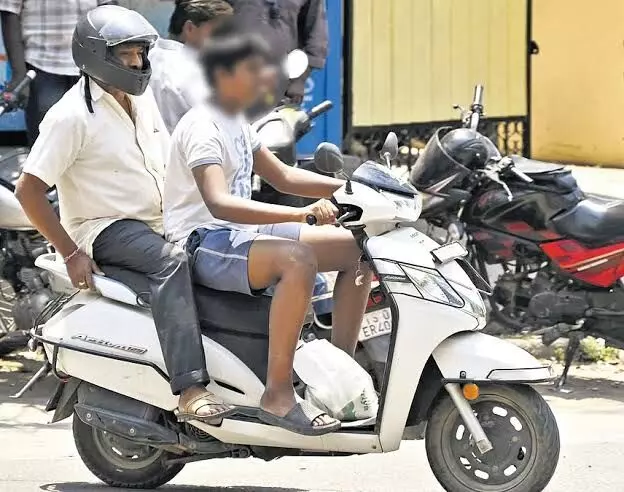Opinion: What are parents teaching their children when they break traffic rules
As parents rush to get their children to school, they often weave through traffic, jump at red lights and even drive on the wrong side to save a few minutes
By B.V.Seshagiri Advocate
Representational Image
Hyderabad: Every morning, a silent civics lesson unfolds on our streets. It’s not happening in a classroom with textbooks and a teacher, but in the backseats of our scooters and cars.
As parents rush to get their children to school, they often weave through traffic, jump at red lights and even drive on the wrong side to save a few minutes.
Without even realising, we are teaching a powerful and dangerous lesson to our children; rules are flexible, convenience is more important than the law and urgency justifies breaking the rules.
The hidden curriculum of our daily actions
Children are our first and most observant students. They learn values not from lectures, but from watching us.
When we make an illegal U-turn or bully our way past a traffic cop, we are sending a clear message: rules are for others, or for when it’s convenient. We worry about the rising lawlessness in our society, but we may be raising the very generation that will perpetuate it, simply through our actions.
Consider this common scenario: A father, late for his child’s exam, speeds through a one-way street and is stopped by a traffic constable. He shouts, “Do you want her to miss her exam?” The constable, unwilling to delay a child’s education, lets him go. In that moment, three lessons were taught:
- Breaking the law is okay if you have a ‘noble’ reason.
- Authority can be bypassed with pressure.
- Rules don’t apply to those who are in a hurry.
What civic sense will that child, who may one day become a government officer, a lawyer or even a parent, carry forward?
From traffic signals to national character
A nation’s character is not forged in the Legislative Assemblies and the Parliament; it's shaped in the small, everyday choices we make.
It’s in the way we treat the law when no one is watching. As Mahatma Gandhi famously said, “Be the change you wish to see in the world.” But today, many of us are demonstrating the opposite: “Break the rule if it inconveniences you.”
As a practising advocate, I’ve seen firsthand how juvenile crime is often rooted in this casual disregard for the law.
When young people are caught driving without a license or vandalising property, their defence is often chilling: “My dad does it too.” This isn’t just about traffic violations; it’s about normalising small-scale illegality, a habit that can easily escalate. We can’t compartmentalise our values. A person who cheats the traffic system today may rationalise cheating on their taxes tomorrow. The law is a single fabric, and when we tug at one corner, the entire weave weakens.
A call for conscious citizenship
India doesn’t just need legal reforms; it needs a reform in everyday civic behaviour, and that starts at home.
Let’s teach our children that following the law is a sign of strength and self-respect, not weakness. It’s braver to wait at a red light when you’re late than to break it. The example of a mother who patiently waits at a red signal even when the road is clear, explaining to her child, “Rules are rules,” is more impactful than any lecture.
To foster a culture of integrity, we need to make some changes:
Make home the first classroom: Civic education begins with us. Our actions are the most important lessons our children will ever receive.
Empower traffic police as educators: Instead of just being enforcers, traffic cops should be trained to engage with parents and children, turning every stop into a civic lesson.
Create ‘discipline zones’ around schools: Just as we have silent zones near hospitals, let’s create school zones that are models of disciplined behaviour, with zero tolerance for rule-breaking.
Launch public campaigns with real stories: Let’s use social media to showcase parents who model integrity, choosing the right path even when it costs them time.
The future of India is not just being shaped in legislative halls, but in the backseats of thousands of vehicles every morning, at our homes, at breakfast, lunch and dinner conversations. Before we demand accountability from our leaders, let’s ask ourselves:
What message did I send to my child today?
Was it one of convenience over character?
Or integrity over impulse?
We cannot expect our children to uphold the Preamble if they witness us disrespecting a red light at a signal. The values they absorb from our daily actions become their deepest convictions, their personal constitution.
Let us commit to raising a generation that understands that true strength lies not in bending rules, but in upholding them. Our example is their most powerful lesson. What they see, they will do. Let’s ensure they see a future worth building.
BV Seshagiri is an advocate and socio-political activist
Disclaimer: The views and opinions expressed in the article are those of the author and do not reflect the official policy or position of NewsMeter.